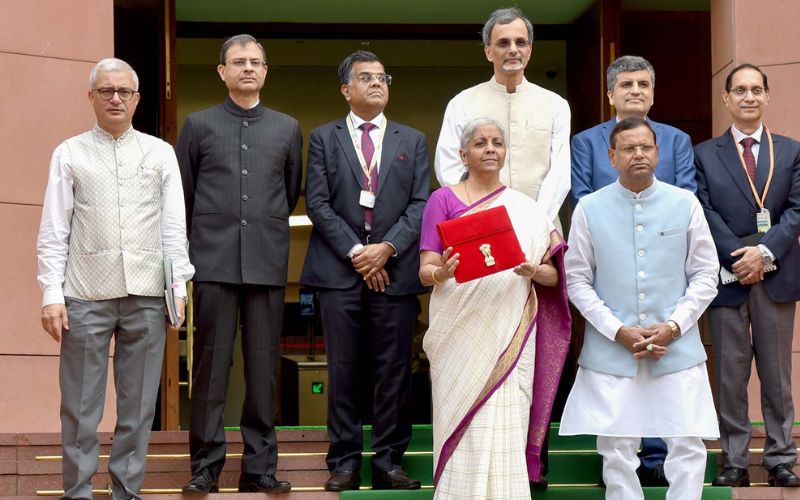“The fiscal consolidation path announced by me in 2021 has served our economy very well, and we aim to reach a deficit below 4.5 per cent next year. From 2026-27 onwards, our endeavour will be to keep the fiscal deficit each year such that the Central Government debt will be on a declining path as percentage of GDP.” Union Minister for Finance and Corporate Affairs Nirmala Sitharaman
Union Minister for Finance and Corporate Affairs Nirmala Sitharaman presented the Union Budget 2024-25 in Parliament today.
The Macro-Economic Framework Statement and the Medium-Term Fiscal Policy cum Fiscal Policy Strategy Statement gives a bird-eye view of the key fiscal indicators of the Indian Economy, which is seen to be exhibiting unmistakable resilience in a relatively uncertain global economy. The Government would pursue a broad path of fiscal consolidation to attain a level of Fiscal Deficit lower than 4.5 per cent of GDP by FY 2025-26 with resultant consolidation of Debt to GDP ratio while continuing with its efforts to usher and sustain broad based inclusive economic growth and welfare for the people.
India’s Real growth at 8.2 percent and Nominal growth at 9.6 percent in FY 2023-24. The private consumption expenditure registered a growth of 4.0 per cent in FY 2023-24, driven by resilient urban demand conditions and recovery in rural demand.
The Reserve Bank of India projects a growth of 7.2 per cent for India in FY 2024-25. The promising outlook for the agricultural sector is emerging with above normal southwest monsoon forecast. Strong corporate and bank balance sheets and Government’s continuous focus on capital expenditure is expected to sustain growth, high-capacity utilisation, and business optimism, are favorable for investment activity.
Average retail inflation eases to 5.4 per cent in 2023-24 compared to 6.7 per cent in FY 2022-23. The Headline inflation stood at 5.1 per cent in June 2024, with much lower core inflation of 3.1 per cent. The overall retail inflation is within the notified tolerance band of 2 to 6 per cent of RBI.
For the year 2024-25, the total receipts other than borrowings and the total expenditure are estimated at ₹32.07 lakh crore and ₹48.21 lakh crore respectively. The net tax receipts are estimated at ₹25.83 lakh crore. The fiscal deficit is estimated at 4.9 per cent of GDP. The capital expenditure is pegged at ₹11,11,111 crore (3.4 per cent of GDP). It includes ₹1,50,000 crore of financial assistance to the States for capital expenditure. The budgeted capital expenditure is almost 3.3 times of the capital expenditure in FY 2019-20 and 23.0 percent of total expenditure in BE 2024-25.
Union Minister of Finance said “The fiscal consolidation path announced by me in 2021 has served our economy very well, and we aim to reach a deficit below 4.5 per cent next year.” She also added that the Government is committed to staying the course. Smt. Nirmala Sitharaman said “From 2026-27 onwards, our endeavour will be to keep the fiscal deficit each year such that the Central Government debt will be on a declining path as percentage of GDP.”
The fiscal deficit of the Union Government declines to 5.6 per cent of GDP as per 3 Provisional Actuals (PA) published by the Controller General of Accounts (CGA), while the revenue deficit declined to 2.6 per cent of GDP in FY 2023-24.
Gross market borrowings through dated securities are estimated at ₹14.01 lakh crore and net market borrowings at ₹11.63 lakh crore during 2024-25. Both will be less than that in 2023-24.
Gross non-performing assets (GNPA) ratio of Scheduled Commercial Banks’s reduces to 2.8 per cent at the end of March 2024 from its peak of 11.2 per cent in FY 2017-18. The SCBs bolstered their capital base by capitalizing reserves from higher profits and raising fresh capital, their capital-to-risk-weighted assets ratio (CRAR) became 16.8 per cent in March 2024, well above the regulatory minimum.
For BE 2024-25, Gross Tax Revenue (GTR) is projected to grow at 11.7 percent over RE 2023-24 and 10.8 percent over PA 2023-24. GTR is estimated at ₹38.40 lakh crore (11.8 per cent of GDP). The Direct and Indirect taxes are estimated to contribute 57.5 per cent and 42.5 per cent, respectively, to GTR. In BE 2024- 25, after tax devolution to States, the Tax Revenue (Net to Centre) is projected at ₹25.83 lakh crore. Non-Tax Revenue is projected to be at ₹5.46 lakh crore which is 45.2 per cent more than the RE 2023–24 of ₹3.76 lakh crore, mainly on account of better dividend receipts.
The major subsidies as percent of GDP are expected to decline from 1.4 percent in RE of 2023-24 to 1.2 percent in BE of 2024- 25. Major subsidies, at ₹3.81 lakh crore, would constitute about 10.3 per cent of revenue expenditure in BE 2024-25.
To achieve a balance between Revenue receipts and Revenue expenditure, in BE 2024-25, revenue receipts and revenue expenditure of the Central Government are estimated at ₹31.29 lakh crore and ₹37.09 lakh crore, respectively.
The GST receipts are estimated at ₹10.62 lakh crore in BE 2024-25, registering a growth of 11.0 per cent over RE and PE for FY 2023-24. Buoyant GST collections in FY 2023-24 sets a new milestone with total gross GST collection of ₹20.18 lakh crore, reflecting an 11.7 per cent increase over FY 2022-23.
The gross tax revenue increases by13.4 per cent and tax-net to Centre increases by 10.9 percent. The Revenue receipts show continued buoyancy in the past years, driven by robust growth in tax collection. The total expenditure of the Union Government registers a growth of 5.9 per cent in FY 2023-24 (PA).
Source: PIB

